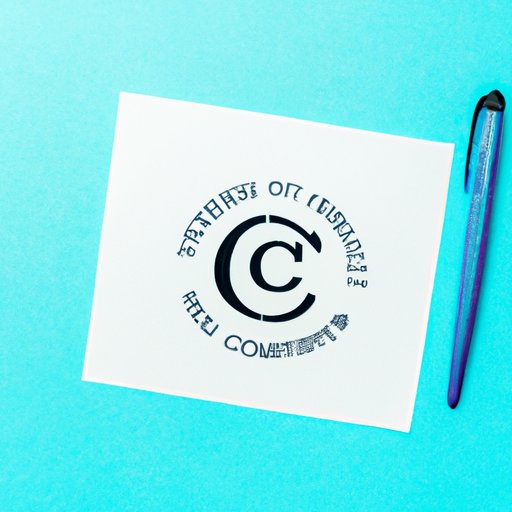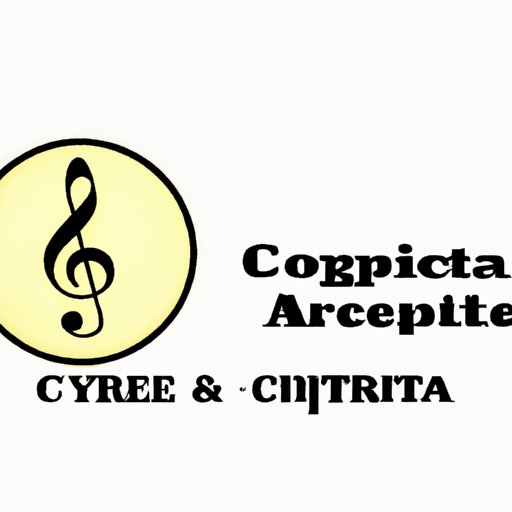
I. Introduction
As a songwriter, you put countless hours of hard work and creativity into your music, and it’s important to protect that intellectual property. Copyrighting your songs is essential to safeguarding your work, ensuring that you receive the financial benefits you deserve and preventing plagiarism and infringement.
In this article, we’ll provide you with a comprehensive guide to copyrighting a song, outlining the legal requirements, breaking down the process into doable steps, and providing tips for protecting your work.
II. Step-by-Step Guide: How to Copyright a Song
The first step in copyrighting your song is creating a tangible copy of it. This can be a written recording or digital copy.
Next, you’ll need to visit the official US Copyright Office’s website or download a paper application form. You’ll then need to provide some vital information about the song to complete the application.
It’s recommended that you conduct some research regarding other musicians, authors, and publishers who may hold similar copyrights before submitting the application and registration fees.
After submitting your application, the US Copyright Office will perform a full examination of your work, making sure it meets the legal requirements before approval.

III. Legal Requirements for Copyrighting a Song
The legal requirements for copyrighting a song are relatively simple. Your work must be original, meaning it needs to be born out of your imagination and effort. It should also be in a tangible form that can be reproduced, such as in a digital or written format.
Your work must not infringe on the rights of someone else’s intellectual property rights. Copyright protection only extends to the specific expression used, not the idea or concept behind it. You cannot protect a title or a mere concept, only the specific expression of the idea.
Your music does not need to be registered with a copyright office, but the benefit of doing so is that it provides you with evidence of your ownership that can be used in legal proceedings to protect your music.
IV. The DIY Guide to Copyrighting a Song
You can file for a copyright application without the assistance of a legal expert. It can be a simple and straightforward process as long as you have the necessary information and materials ready.
It’s important to keep evidence of your musical creation and that it’s unique. You can keep a diary, notes, photographs, prototypes, and other materials that document the creative process.
You can also indicate that your music is copyrighted on all digital distributions platforms that allow you to do so. It’s also important to keep in mind that registering your work with a copyright office ensures maximum protection from infringement.
V. Mistakes Songwriters Should Avoid When Copyrighting Their Work
There are common mistakes that songwriters make when trying to copyright a song, leading to delayed, or even lost, protection for their work. A couple of things to avoid are submitting the wrong application forms and misreading legal documentation, which can lead to additional fees and delays.
Missing a deadline can result in a complete loss of protection for your work, leaving your music vulnerable to unauthorized use or infringement.
VI. The Benefits of Copyrighting a Song
Copyright provides the creator of an original work with protection from infringement and financial benefits for their music. Copyright law provides the exclusive right for a musician or songwriter to make and distribute copies of their work, adapt it or derive work from it, and perform it publicly. Protecting your work can lead to ownership of the content. Owning the rights to your work provides you with a significant bargaining chip when licensing your music for use in other productions, branding, or composing for films, commercials, and other media.
VII. Best Practices for Songwriters When Copyrighting Their Work
It’s essential to keep accurate documents of all communications and interactions with other artists. Identify the people who contributed to your creative process and keep evidence; this will help you resolve any potential disputes that may arise in the future.
Be active in protecting your music. Always monitor distribution channels and take action if you become aware of any unauthorized use of your work. Work with a professional in the music industry to handle copyright infringement disputes.
VIII. Creative Collaboration: How to Copyright Collaboratively Written Songs
If you’re collaborating with other songwriters, composers, or musicians, it’s crucial to have clear agreements about the copyright of the end product. Communication is key when working collaboratively. Agree on project ownership and roles at the beginning of the project. Be sure to document the original expression and file for a copyright application with all owners of the work listed.
Consult with an entertainment lawyer when establishing terms and conditions for collaboratively created works. A lawyer can ensure that the agreement is fair and productive for all parties involved.
IX. Conclusion
Copyright registration provides essential protection for your original music and provides financial and legal benefits for your work. Our comprehensive guide offers useful tips, best practices, and insights for avoiding common mistakes when registering your music’s copyright, as well as creative collaboration and how to protect your intellectual property rights.
Don’t neglect to protect your work’s intellectual property rights. Register your music, protect your interests, and ensure that you receive the recognition you deserve.




